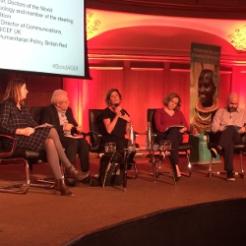The international aid community has been “castrated” by the refugee incursion at Calais, the executive director of Doctors of the World told the AGM of Bond, the infrastructure body for NGOs, this week.
Leigh Daynes said the Calais crisis was notable for both the democratisation of aid – lots of people desperate to help turning up in rented vans with donated money and goods to support the refugees – and the politicisation of aid.
“The UN and its agencies are not acting in Calais and the international NGOs are not doing enough,” he said. “Where is the Disasters Emergency Committee? Where are we? If it was a refugee crisis in any other setting we would all be there.” He said that because it had been painted as a migrant crisis, people were reluctant to offend.
“The aid community has been castrated by Calais,” Daynes concluded.
He was taking part in a panel debate at the end of the annual general meeting of NGO umbrella body Bond on Monday, staged to consider different perspectives on the refugee crisis.
Fellow panellist Sorcha O’Callaghan, head of humanitarian policy at the British Red Cross, said that refugees now comprised a quarter of Lebanon’s population, a fact which rendered the UK government’s protests about the lack of capacity here “shameful”.
“We have a very small fraction of all the refugees,” O'Callaghan said.
She added that it was not just a Middle East crisis but a series of global interconnected crises involving places such as Somalia, Sudan, South Sudan, and Eritrea.
Another panel member, Sami Ramadani, steering committee member of the Stop the War Coalition, said the current crisis in the Middle East had been sparked by the destruction of four states – Afghanistan, Iraq, Libya and Syria. “Syria is the focus and the rise of Isis is also the direct result of these wars,” he said.
Now there are four million Syrian refugees, mainly in Lebanon, Turkey and Jordan.
A member of the audience suggested that the NGO community, as well as failing operationally to help the tide of refugees, had also failed to get the right messages across to the UK public. “There are more Syrian refugees in Istanbul than refugees in the whole of the rest of Europe,” he said. “These are the facts but I think we have maybe failed to get that message across to the British public.”
Not a crisis but the ‘new normal’
Panellist Lily Caprani, deputy director of communications, advocacy and programmes at Unicef UK, posed a question about whether the aid community was right to continue describing the current situation as a “crisis” because that suggests it is time-limited and will ebb away after reaching a peak.
She suggested instead that it is a “paradigm shift” and should be portrayed as the “new normal” for which a long-term strategy is required as well as an immediate response to urgent need.
Caprani said the current narrative whereby the refugee influx to Europe is represented as something that can be contained or solved by throwing money at, is wrong.
Ramadani agreed that the media portrayal of the situation was a big problem: “One Syrian passport [found on or next to the body of one of the Paris attackers] has destroyed the image of millions of refugees.”
From the audience John Bines, chief executive of Everychild, wondered whether there is a role for NGOs to better inform their own supporters about the realities of the situation so that those supporters will then work to change public opinion and thereby public policy.
O'Callaghan added: “We have a responsibility as a community to refocus attention on the human impact of this crisis. These are people who have fled appalling situations.”
Ramadani said Britain should be using its enormous power and role in the global stage to actively oppose war – it should completely refashion its entire foreign policy because “tying ourselves to Washington has brought one disaster after another”.
And international NGOs "are not political parties but we have to be more proactive at supporting peace and social justice in the world," he said.









